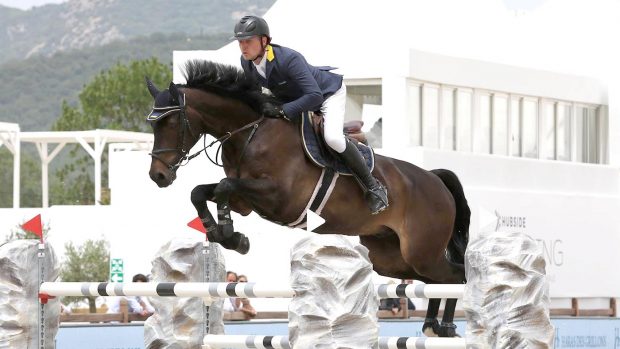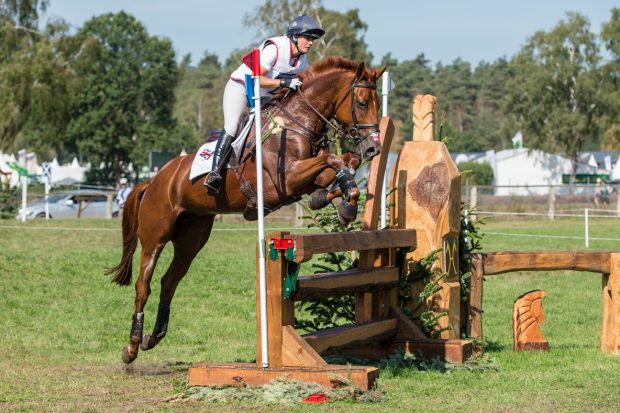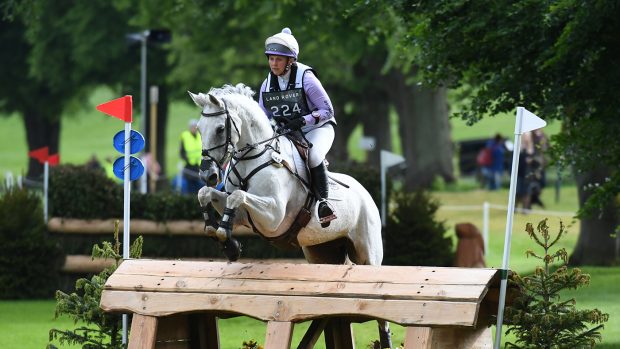Two yellow cards and three verbal warnings were given out by FEI officials at the South of England International Horse Trials last month.
Chelsea Pearce and Khia Cadney-Moon were given the cards, for excessive use of whip and excessive use of bit causing bleeding respectively.
Former Burghley winner Chris Burton was given a verbal warning for hitting a horse on the head, and one for issues with a microchip, while Katie Bleloch was also warned for “hitting and jumping horse in the collecting ring after [cross-country]”.
Chelsea said her horse Albert VI had had an issue with the water at Blair CIC3* in August, then also refused at the South of England CIC2*.
“I put it down to the fact he’d lost a bit of confidence, maybe from tackling his first three-star,” she told H&H. “I gave him a couple of smacks once he’d stopped, and we went on to be eliminated.
“He’s quite a big horse and even in the dressage, I have to be quite firm with my aids, but I know this was the wrong way to go about it. It was more of an in-the-moment thing, which I regret doing.”
Khia said she was “devastated” to get a phone call two days after the event to tell her of the yellow card decision, relating to Milwaukee 8 in the CIC*.
“It was a complete shock to me as the FEI did not speak to me on the day,” she told H&H. “I was trying a new bit, which was legal, as this particular horse can get strong across country. Unfortunately this was the cause of a small rub on one side of the mouth, which I was unaware of until the finish.
“The vet on site came to check the horse and on examination stated that no treatment was necessary.
“As I understood at the time the vet was not at all concerned by the horse’s welfare and no further action was to be taken. The wellbeing and care of my horses is absolutely paramount at all times and I am very sorry for this regrettable incident.”
Chris said of his warnings: “The two incidents at South of England were unfortunate for myself and my horses. I took an unaffiliated horse to work who was misbehaving.
“The other offence was for a new ride to our yard, which was found [to be] without a microchip. This was a surprise to us as she has done many FEI competitions with her previous rider.
“Ultimately I am the person responsible and I take this side of the sport very seriously. Officials have a job to do and they exercised their right as they saw fit in accordance with the FEI rules. I have accepted and respect the decisions made.”
Continues below…

Subscribe to Horse & Hound magazine today – and enjoy unlimited website access all year round
Katie told H&H she is disputing the circumstances of her verbal warning, as she said the incident took place on the cross-country rather than in the collecting ring after her round, on Bulano in the CIC2*.
“My horse stopped and I turned him to go and jump the fence again, but then decided to retire,” she said.
“I put my hand up to retire, then gave him a smack after that. I definitely didn’t jump him again in the warm-up, and it was one smack.”
Following the incidents, an FEI spokesman emphasised that the rules and sanctions are in place to safeguard horse welfare and ensuring a level playing field for all competitors.
“As the global governing body, our key role is to govern equestrian sport, and two crucial elements of that are safeguarding horse welfare and ensuring a level playing field,” the spokesman said.“The FEI is responsible for putting in place welfare standards for competing horses and ensuring that the rules are implemented and adhered to at all levels of competition.
“FEI officials work on site at all FEI events and one of their roles is to make sure the FEI rules are not only respected, but also enforced. Ground juries in all disciplines use the disciplinary measures available to them, such as verbal warnings and yellow warning cards, to penalise infringements of those rules which cover all aspects of the sport’s governance.
“As article 169 (7.1) of the FEI general regulations explains: a yellow warning card may be delivered to the person responsible by the ground jury in cases of offences which are of a less serious nature and/or in cases specified in the sport rules, such as incorrect behaviour towards event officials. The significance of the yellow warning card is the fact that an athlete will incur a suspension if they are sanctioned with a yellow warning card twice (in eventing this must be for the same offence) within a 12 month period, so there is a strong deterrent effect.”
For all the latest news analysis, competition reports, interviews, features and much more, don’t miss Horse & Hound magazine, on sale every Thursday.




